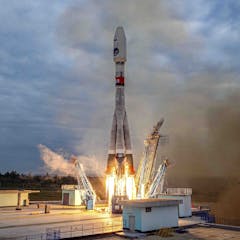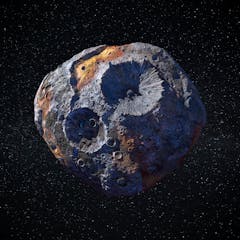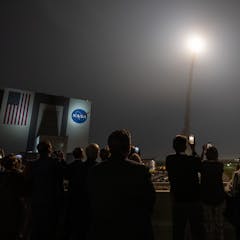
Articles on Space
Displaying 101 - 120 of 754 articles

Months after a military officer made sensational claims about unexplained objects in the skies, NASA released a report loosely outlining a scientific approach for analyzing UAP reports.

There’s a chance Nishimura might brighten unexpectedly – but it’s a slim one.

You can’t bring your AC to space, unfortunately, but innovative flow boiling and condensation research might lead to lighter, more efficient heating and cooling on spacecraft.

The results are intriguing, but analysing the atmospheres of exoplanets is no easy task.

An astronomer and ‘black hole historian’ explains how the parts of the universe black holes grow in might influence how quickly they become bright, supermassive objects.

Treaties meant to ensure sustainability in space don’t currently regulate private companies, and not every country has signed on to an agreement for sustainable space exploration.

A new hypothesis suggests that the universe may be twice as old as we had believed. Observations from the James Webb Space Telescope provide new information on the rate of the universe’s expansion.

Space missions are still difficult, dangerous and risky – but it’s still early days in the human journey beyond our planet.

India became the first country to land near the south pole of the Moon, a notoriously difficult achievement that also marks them as the fourth country to land on the Moon.

The Indian spacecraft could lay the ground for future missions with astronauts, and even for lunar bases.

Astronomer Caroline Herschel’s work discovering and cataloging astronomical objects in the 18th century is still used in the field today, but she didn’t always get her due credit.

Liftoff to the distant asteroid is scheduled for Oct. 5, 2023 – the beginning of a six-year journey to one of the most unusual objects in the solar system.

With commercial space tourism on the rise and NASA planning to return to the Moon, you might think the US space economy is booming – but the data paint a more complex picture.

We’re currently a few years into the 25th studied solar cycle. An 11-year period of sun activity, this solar cycle is more active than previously expected.

Solar panels in space could harness more of the Sun’s energy.

To detect dark matter, you need to build an ultra-sensitive detector and put it somewhere ultra-quiet. For one physics collaboration, that place is almost a mile under Lead, S.D.

The universe used to be filled with a hydrogen fog, before early stars and galaxies burned through the haze. Astronomers are studying galaxies that tell them about this period in the early universe.

A new survey catalogs Americans’ expectations about the future of space, from NASA to SpaceX. Two space policy experts describe how these results stack up against the current state of space affairs.

To find out what is beyond space, a good place to start would be to figure out where space – our universe – ends.

If an astronaut were to die on Mars, neither cremation nor burial would be good options.





